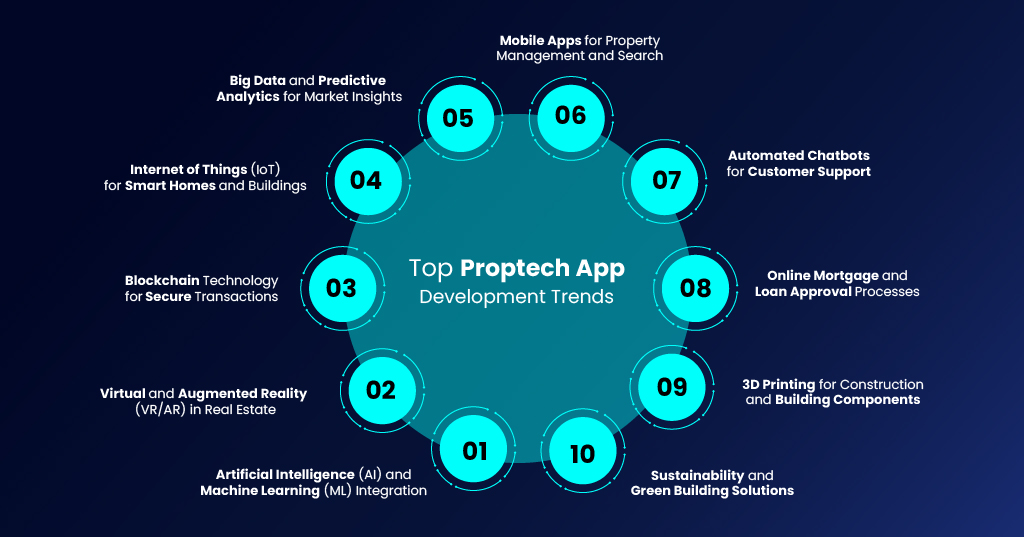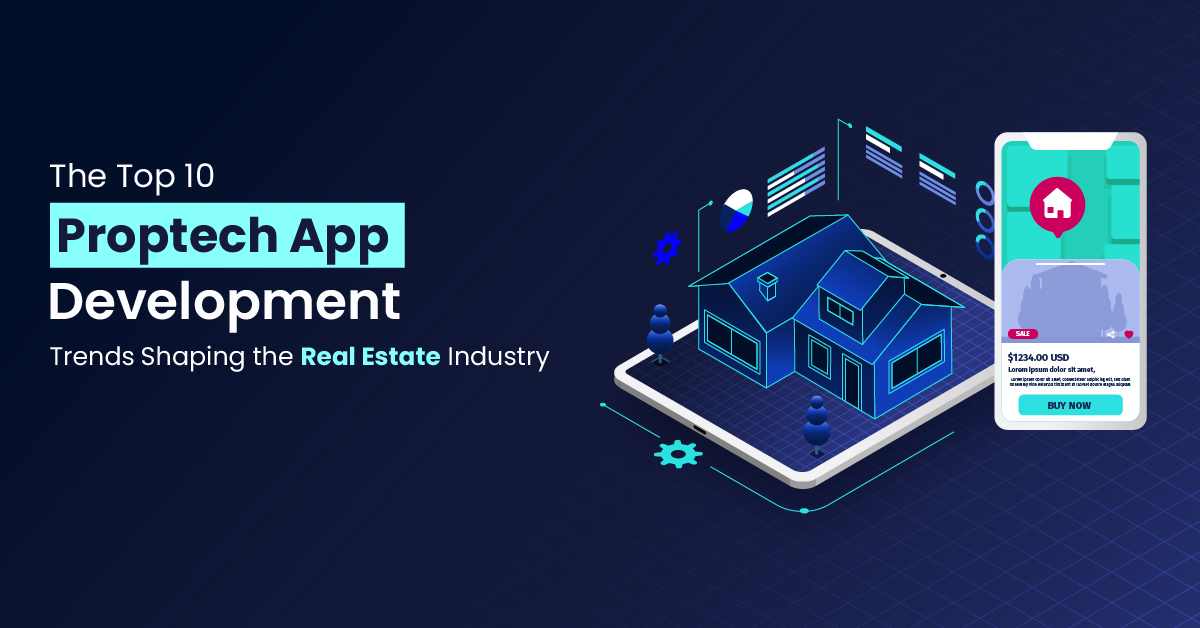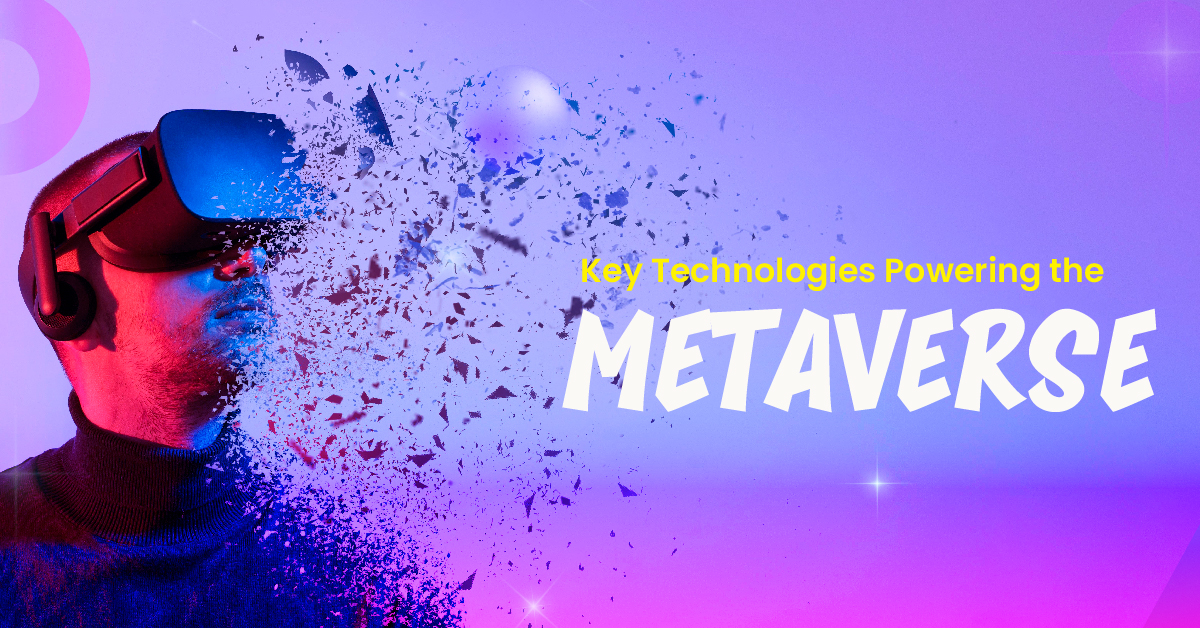The Top 10 Proptech App Development Trends Shaping the Real Estate Industry
In the rapidly evolving world of real estate, Proptech is emerging as a game-changer. Integrating top-tier technologies, such as AI, ML, VR, and AR, is revolutionizing how properties are bought, sold, rented, and managed. Proptech is unlocking new opportunities for growth and success in the real estate market with improved efficiency, convenience, and transparency. Discover the exciting potential of Proptech and stay ahead of the curve.
The real estate industry has traditionally been slow to adopt technological advancements. But in recent years, it has significantly transformed thanks to the rapid advances in app development and digital solutions. Property technology, or Proptech, has emerged as a game-changer in this sector and has completely revolutionized how properties are bought, sold, rented, and managed.
These apps harness cutting-edge technologies to offer improved efficiency, convenience, and transparency in the real estate market. Therefore, giving rise to various trends that are shaping the future of the real estate industry. However, the question is, what are these emerging proptech trends, and what potential do they hold for the future of the real estate industry?
Let’s explore the top 10 Proptech app development trends driving innovation and transforming the real estate experience.

1. Artificial Intelligence (AI) and Machine Learning (ML) Integration
To begin with, the integration of Artificial Intelligence (AI) and Machine Learning (ML) is reshaping how the real estate industry operates. It has considerably improved its traditional processes, offering automation, advanced decision-making capabilities, and enhanced customer experiences.
Take AI-powered chatbots and virtual assistants as an example. They are well capable of providing instant and personalized customer support, answering queries, and guiding users throughout their property search and purchase journey.
By leveraging natural language processing and machine learning algorithms, these chatbots can understand customer needs, provide relevant information, and even schedule property viewings.
This enhances customer satisfaction and frees up human resources to focus on more complex tasks. According to a report by McKinsey & Company, AI applications in real estate could potentially automate up to 80% of administrative tasks, leading to significant time and cost savings.
Moreover, a study conducted by Stanford University found that AI-powered virtual assistants in real estate significantly improved customer satisfaction. The study further revealed that users appreciated the convenience, responsiveness, and round-the-clock availability of AI-based systems, which resulted in higher engagement and increased customer loyalty.
On the other hand, ML algorithms play a crucial role in analyzing vast amounts of real estate data to extract meaningful insights. By analyzing historical transaction data, market trends, and property attributes, ML algorithms can predict future market trends, optimize pricing strategies, and even personalize property recommendations based on individual preferences.
This level of data-driven decision-making empowers real estate professionals to make informed choices and stay ahead of the competition. McKinsey & Company report further highlights that ML algorithms can accurately predict property prices with an average error rate of just 1-2%, making them highly reliable tools for pricing optimization.
Therefore, integrating AI and ML technologies in the real estate industry holds immense potential for streamlining processes, enhancing decision-making, and providing exceptional customer experiences. Additionally, real estate professionals can unlock new opportunities, improve efficiency, and stay ahead in an increasingly competitive market.
2. Virtual and Augmented Reality (VR/AR) in Real Estate
Similarly, Virtual Reality (VR) and Augmented Reality (AR) have revolutionized how properties are showcased and experienced. These immersive technologies provide potential buyers with interactive and realistic experiences, saving time and effort while enhancing their overall experience.
For example, with VR headsets or even through web-based platforms, potential buyers can virtually explore properties from the comfort of their homes. They can navigate through different rooms, examine details, and get a sense of the property’s layout and spatial dimensions.
This immersive experience gives buyers a realistic understanding of the property and its potential, even if they are physically located far away. Virtual property tours eliminate the need for in-person visits to multiple properties, saving time and resources for both buyers and sellers.
A study by the National Association of Realtors (NAR) revealed that 77% of homebuyers found virtual property tours to be useful in their property search. The study also highlighted that VR tours increased engagement and helped potential buyers develop a stronger emotional connection with the properties they viewed.
Likewise, AR applications enable users to visualize how furniture or decor would look in a space, facilitating better design choices. By using smartphone cameras or wearable AR devices, users can overlay virtual furniture, decor, or even architectural elements onto a real-life environment.
This enables them to see how different furnishings would look and fit in a specific space, facilitating better design choices and reducing the guesswork involved in interior design. AR technology provides users with a tangible and interactive way to personalize and envision their future living or working spaces.
Research by the University of North Carolina found that AR-based visualization tools significantly improved user satisfaction and reduced decision-making time. Users reported higher confidence in their design choices when using AR applications to preview furniture and decor in real environments.
So, this clearly demonstrates the transformative impact of VR and AR technologies in the real estate industry. By providing immersive and interactive experiences, virtual property tours and AR visualizations enhance customer engagement, facilitate faster decision-making, and create a more efficient property search and design process.
3. Blockchain Technology for Secure Transactions
When discussing Proptech app development trends and their future potential, let’s not forget the role Blockchain technology plays. It is undoubtedly a game changer since it ensures transparency, security, efficiency, and immutability in transactions.
By leveraging decentralized ledgers and smart contracts, blockchain eliminates the need for intermediaries, mitigates the risk of fraud, and ensures the immutability of property records. It also speeds up the verification and approval processes, reducing the time and cost associated with traditional paperwork.
For example, smart contracts can streamline property transactions by automating tasks such as title transfers, escrow arrangements, and payment settlements. This eliminates the need for multiple intermediaries, reduces the potential for human errors, and speeds up the transaction process.
Additionally, blockchain provides a tamper-proof and transparent record of property ownership and history. Once a property transaction is recorded on the blockchain, altering or tampering with the information becomes virtually impossible. This enhances the security and trustworthiness of property records, reducing the risk of fraudulent activities such as double-spending or falsifying ownership documents.
For instance, a report by Deloitte highlights that blockchain can significantly streamline the title transfer process, reducing the time and cost associated with traditional paperwork. The report also emphasizes that blockchain’s immutability feature ensures the integrity of property records, reducing the risk of disputes and enhancing trust among stakeholders.
Furthermore, pilot projects and collaborations have demonstrated the practical application of blockchain in real estate. For example, in Sweden, the government has partnered with a blockchain startup to conduct a pilot project for property transactions using blockchain technology. The project aimed to showcase blockchain’s efficiency, transparency, and security in real estate transactions.
Therefore, by leveraging decentralized ledgers and smart contracts, blockchain offers secure, transparent, and efficient transactions, reducing paperwork, eliminating intermediaries, and ensuring the integrity of property records.
4. Internet of Things (IoT) for Smart Homes and Buildings
Similarly, the Internet of Things (IoT) has ushered in a new era of innovation in the real estate industry. IoT devices, such as smart thermostats, lighting systems, security cameras, and door locks, enable homeowners and property managers to remotely control and monitor various aspects of a property. These devices enhance energy efficiency, improve security, and provide valuable data for maintenance and management purposes.
For example, connected security cameras, motion sensors, and door locks provide real-time monitoring and alerts, allowing homeowners and property managers to keep a watchful eye on their properties even when they are away. These devices can send notifications to users’ devices in case of any suspicious activity, enabling timely responses and enhancing overall safety.
Additionally, IoT devices generate a wealth of data that can be leveraged for maintenance and management purposes. Property managers can gain valuable insights into energy consumption patterns, occupancy rates, and equipment performance by collecting and analyzing data from various sensors and devices. This data-driven approach enables proactive maintenance, optimizing resource allocation, and improving operational efficiency.
According to a report by Statista, the number of connected IoT devices in the smart home segment is projected to reach over 1.6 billion by 2023. This demonstrates the growing adoption of IoT technology in the real estate sector, driven by the desire for improved comfort, convenience, and efficiency.
In addition to this, a study conducted by the American Council for an Energy-Efficient Economy (ACEEE) found that smart thermostats, when combined with other energy-saving measures, can lead to energy savings of up to 10-30%. The study also highlighted that IoT-enabled lighting systems, such as smart bulbs and automated controls, offer significant energy-saving potential.
Thus by embracing IoT technology, homeowners and property managers can create smarter, more sustainable, and interconnected living and working environments.
5. Big Data and Predictive Analytics for Market Insights
The real estate industry generates massive data, ranging from property listings and transaction history to market trends and demographic information. Big Data analytics and predictive modeling help industry professionals gain valuable insights into buyer preferences, pricing patterns, and investment opportunities.
For example, by analyzing historical transaction data, online search behavior, and demographic information, real estate professionals can identify patterns and trends that help them better understand what buyers are looking for. This information can inform decisions related to property development, pricing, and marketing strategies, leading to more targeted and effective approaches.
Moreover, predictive analytics enables real estate professionals to forecast market trends and anticipate future demand. By applying advanced statistical modeling techniques to historical data, predictive analytics can identify patterns and correlations that help in predicting market fluctuations, pricing trends, and investment opportunities.
A study published in the Journal of Real Estate Research highlights that using predictive modeling techniques improved the accuracy of property price predictions, with some models achieving an accuracy rate of over 90%.
Furthermore, a report by PwC states that real estate companies that effectively leverage data analytics and predictive modeling gain a competitive edge in the market. These companies can identify untapped market segments, optimize marketing campaigns, and tailor their offerings to meet specific customer needs, resulting in increased customer satisfaction and higher conversion rates.
So, by embracing Big Data analytics and predictive modeling, real estate professionals can unlock valuable market insights, enhance decision-making processes, and stay ahead in a dynamic and competitive industry.
6. Mobile Apps for Property Management and Search
Mobile apps have revolutionized how property management and search are conducted, providing users with convenient and efficient tools at their fingertips. These apps offer a range of features that enable users to browse, search, and manage properties seamlessly. From property search and scheduling viewings to submitting rental applications and making rent payments, mobile apps have become an essential tool for landlords and tenants in the real estate industry.
Users can leverage these mobile apps to browse and filter properties based on specific criteria, such as location, price range, and amenities. They can view property details, high-resolution images, and even virtual property tours to get a comprehensive understanding of the property without the need for physical visits.
In addition to this, users can complete and submit rental applications digitally, reducing paperwork and expediting the application process. This convenience benefits both tenants and landlords, enhancing the overall efficiency of property management.
Moreover, mobile apps facilitate efficient communication and maintenance management between landlords and tenants. Tenants can easily report maintenance issues, request repairs, and track the progress of their requests.
Landlords, on the hand, can promptly address these issues, ensuring tenant satisfaction and reducing the time and cost associated with manual communication. According to a National Multifamily Housing Council survey, 84% of renters use mobile apps to search for apartments, while 72% prefer using apps for communication with their landlords.
Furthermore, as noted in a study by AppFolio, property management apps can improve operational efficiency by reducing manual tasks and streamlining communication. The study reported that property managers using mobile apps experienced a 25% reduction in time spent on administrative tasks, allowing them to focus more on delivering quality services to their tenants.
Therefore, by leveraging mobile apps for property management and search, real estate professionals can enhance the user experience, streamline processes, and improve overall efficiency in the industry.
7. Automated Chatbots for Customer Support
Automated chatbots have emerged as a transformative tool in the real estate industry, revolutionizing customer support services. These intelligent virtual assistants can handle common inquiries, provide property information, schedule appointments, and assist with the initial stages of property transactions. By leveraging automated chatbots, real estate companies can provide round-the-clock assistance, improve response times, and optimize the allocation of human resources for more complex tasks.
Chatbots are programmed to understand and respond to a wide range of customer queries and requests. They can provide property details, answer frequently asked questions, and guide users through the property search and transaction process. By leveraging natural language processing and machine learning algorithms, chatbots can understand user intents and provide relevant and accurate information in a conversational manner.
This scalability allows real estate companies to efficiently handle high-traffic periods, such as property launches or promotional campaigns, without compromising the quality of customer support. By automating routine inquiries and tasks, chatbots free up human resources, enabling customer service representatives to focus on more complex and value-added interactions.
According to a study by Grand View Research, the chatbot market size is expected to reach USD 1.25 billion by 2025, driven by the increasing demand for automated customer support solutions across various industries, including real estate.
Furthermore, a report by Salesforce highlights that 69% of consumers prefer chatbots for quick communication with brands. The report also reveals that 64% of consumers believe that the 24/7 availability of chatbots is the best feature.
By implementing automated chatbots, real estate companies can enhance customer support services, improve response times, and optimize resource allocation, ultimately leading to increased customer satisfaction and operational efficiency.
8. Online Mortgage and Loan Approval Processes
Moving forward, applying for mortgages and loans has traditionally been a time-consuming and paperwork-intensive process. However, with the advent of Proptech apps, the mortgage and loan approval processes have become faster, more streamlined, and accessible online.
These apps enable users to submit applications, upload required documents, and receive loan approvals or rejections digitally. Online mortgage and loan processes simplify the financing aspect of real estate transactions, making it more convenient for buyers and investors alike.
Digital submission of applications and documents and advanced data verification and processing algorithms expedite the approval process. This results in faster response times and a more efficient overall experience for borrowers.
Moreover, with the availability of Proptech apps, borrowers can initiate and track their applications from anywhere, at any time, using their smartphones or other devices. They no longer need to visit physical branches or adhere to strict office hours. This accessibility gives borrowers more flexibility and control over the financing process, allowing them to progress at their own pace and convenience.
What’s more, the digitization of mortgage and loan approval processes enhances accuracy and reduces the likelihood of errors. By eliminating the manual entry of data and implementing automated data verification mechanisms, Proptech apps ensure that the information provided by borrowers is accurately captured and validated. This reduces the chances of data discrepancies and minimizes the need for time-consuming manual reviews or corrections.
According to a report by Ellie Mae, a leading provider of cloud-based mortgage solutions, the average time to close a mortgage loan decreased from 51 days in 2017 to 47 days in 2019 due to the adoption of digital mortgage technology.
Furthermore, a study by the National Association of Realtors (NAR) found that 78% of homebuyers prefer working with lenders who offer online or mobile application processes. The study also revealed that 87% of millennial homebuyers used online resources during their home search, indicating the growing demand for digital solutions in the real estate financing sector.
Therefore, by embracing online mortgage and loan approval processes through Proptech apps, real estate professionals and borrowers can benefit from faster processing times, enhanced accessibility, and improved accuracy, ultimately simplifying the financing aspect of real estate transactions.
9. 3D Printing for Construction and Building Components
Moreover, 3D printing technology has emerged as a game-changer in the construction industry, offering innovative solutions for building components and structures. This technology enables the creation of complex architectural designs with unprecedented precision and speed.
From 3D-printed walls and facades to entire houses, this revolutionary approach provides cost-effective and sustainable alternatives to traditional construction methods. Integrating 3D printing in real estate promotes efficiency, reduces material wastage, and unlocks new possibilities for design and construction.
By leveraging advanced computer-aided design (CAD) software and robotic extrusion systems, 3D printers can create complex architectural designs that would be challenging or time-consuming to achieve using conventional construction techniques. This level of precision ensures that building components fit seamlessly together, resulting in improved structural integrity and aesthetic appeal.
Furthermore, 3D printing in real estate offers cost-effective solutions by reducing material wastage and optimizing construction processes. Traditional construction methods often involve cutting and shaping materials on-site, leading to significant material wastage.
In contrast, 3D printing enables precise material deposition, minimizing waste and maximizing material utilization.
Additionally, 3D printing eliminates the need for formwork, scaffolding, and other temporary structures typically used in construction, further reducing costs and construction timelines.
Similarly, 3D printing technology also promotes sustainability in the construction industry. By minimizing material wastage and optimizing resource utilization, 3D printing reduces the environmental impact associated with traditional construction methods.
The ability to use sustainable and recyclable materials in 3D printing further enhances the eco-friendly aspects of this technology. As the global focus on sustainable practices intensifies, the adoption of 3D printing in construction aligns with the industry’s sustainability goals.
For instance, a project by Apis Cor, a 3D printing company, successfully demonstrated the construction of a 400-square-foot house in just 24 hours using 3D printing technology. Likewise, a study by the Massachusetts Institute of Technology (MIT) showed that 3D printing technology can reduce material waste by up to 60% compared to traditional construction methods.
By embracing 3D printing technology in the real estate industry, professionals can unlock new design possibilities, optimize construction processes, and contribute to sustainable practices. The integration of 3D printing offers cost-effective and environmentally friendly alternatives, reshaping the way buildings and structures are created.
10. Sustainability and Green Building Solutions
The real estate industry is experiencing a growing emphasis on sustainability and green building practices. Proptech apps and solutions are at the forefront of driving the adoption of eco-friendly initiatives, including energy-efficient systems, renewable energy sources, and the use of green building materials.
These sustainable practices not only contribute to environmental preservation but also offer long-term cost savings for property owners and tenants. For example, these apps offer energy management systems that monitor and optimize energy usage within properties.
By analyzing energy consumption patterns, property owners can identify areas for improvement, such as upgrading to energy-efficient appliances or implementing smart home technologies.
These measures not only contribute to environmental conservation but also result in significant cost savings for property owners and tenants through reduced utility bills.
In this case, Proptech apps provide information on the installation and benefits of renewable energy systems, such as solar panels or wind turbines. These systems enable properties to generate clean and renewable energy, reducing reliance on fossil fuels and lowering greenhouse gas emissions.
Similarly, Proptech apps provide access to information about sustainable construction materials, such as recycled or locally sourced materials, low VOC (volatile organic compound) paints, and energy-efficient insulation. These materials contribute to healthier indoor environments, reduce waste generation, and minimize environmental impact during construction and operation.
A report by the World Green Building Council highlights that green buildings have been shown to reduce energy consumption by up to 30% and water consumption by up to 50% compared to conventional buildings. Additionally, sustainable buildings have been found to have higher occupancy rates, lower operating costs, and improved tenant satisfaction, leading to increased property value and rental income.
Furthermore, a study by the University of California, Berkeley revealed that certified green buildings achieve higher rental rates and sale prices than non-certified buildings. Hence, integrating energy-efficient systems, renewable energy sources, and green building materials contributes to a greener future and enhances the attractiveness and value of properties.
Conclusion
Conclusively, the real estate industry is undergoing a significant transformation with the integration of proptech app development trends. Artificial Intelligence, Virtual and Augmented Reality, Blockchain, IoT, Big Data analytics, and other technological advancements are reshaping the way properties are bought, sold, managed, and experienced.
These trends enhance efficiency, transparency, and customer experiences, making the real estate market more accessible and dynamic. It is imperative for industry professionals to embrace these trends and leverage the power of proptech to stay competitive in a rapidly evolving landscape.
FAQs
How can AI and ML benefit the real estate industry?
AI and ML technologies bring numerous benefits to the real estate industry. They enable automated processes, personalized recommendations, and predictive analytics. AI-powered chatbots provide instant customer support, improving the overall experience. ML algorithms analyze data to identify market trends, optimize pricing strategies, and enhance decision-making.
What are the advantages of using virtual and augmented reality in real estate?
Virtual and augmented reality offer several advantages in the real estate industry. They allow potential buyers to take virtual property tours, saving time and effort. AR applications enable users to visualize how furniture and decor would look in a space. These technologies enhance customer engagement, improve decision-making, and provide immersive experiences.
How does blockchain enhance security in real estate transactions?
Blockchain technology ensures security and transparency in real estate transactions. By leveraging smart contracts and decentralized ledgers, blockchain eliminates the need for intermediaries, reduces the risk of fraud, and ensures the immutability of property records. This enhances trust and streamlines the transaction process, making it more efficient and secure.
What role does the Internet of Things play in smart homes and buildings?
The Internet of Things (IoT) revolutionizes smart homes and buildings by connecting various devices and systems. IoT devices, such as smart thermostats, lighting systems, and security cameras, enable remote monitoring and control. They enhance energy efficiency, improve security, and provide valuable data for maintenance and management purposes.
How does predictive analytics help in making informed real estate decisions?
Predictive analytics leverages data analysis and modeling techniques to make informed real estate decisions. By analyzing market trends, buyer preferences, and historical data, predictive analytics can forecast property prices, identify investment opportunities, and optimize marketing strategies. This helps real estate professionals make data-driven decisions and stay ahead in the market.
At Appricot IT Consultants
We’re driven by our passion for providing top-tier tech solutions to our clients. Our goal is to ensure that your business thrives in the digital age. Join us on a thrilling journey of innovation and growth, as we work together to unleash the full potential of your enterprise.
Related Articles
Satisfy your cravings for knowledge and inspiration!

Cloud Wars - Microsoft vs. Amazon
Learn about the features and benefits of Microsoft Azure and Amazon Web Services, two leading cloud platforms, to understand how to choose the one that best fits your needs

App Development Trends Shaping Real Estate Industry
From virtual and augmented reality to blockchain and smart contracts, discover the top 10 proptech app development trends that are shaping the future of the real estate industry.

Key Technologies Powering the Metaverse
Explore how top-tier technologies, such as blockchain, cryptocurrency, and NFTs, intertwine to create Metaverse, and how you can benefit from the opportunities they offer
